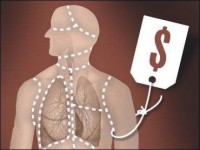Fact file
Top transplant surgeons involved in organ trafficking
AP
 Top transplant surgeons are collaborating with criminal organ trafficking networks to target the desperate, an expert said recently. "It involves people from the highest level of their profession," said Nancy Scheper-Hughes, founding director of Organs Watch, an academic research project at the University of California, Berkeley. Some surgeons are "willing to collaborate with the lowest levels of society with criminal networks, brokers and with kidney hunters, who are the absolutely necessary factor," she said.
Top transplant surgeons are collaborating with criminal organ trafficking networks to target the desperate, an expert said recently. "It involves people from the highest level of their profession," said Nancy Scheper-Hughes, founding director of Organs Watch, an academic research project at the University of California, Berkeley. Some surgeons are "willing to collaborate with the lowest levels of society with criminal networks, brokers and with kidney hunters, who are the absolutely necessary factor," she said.
Scheper-Hughes, a professor who is also the director of the university's medical anthropology program, made her remarks at the Vienna Forum to Fight Human Trafficking. Organs Watch has a presence in 10 countries with anthropologists, human rights activists and doctors who volunteer, some of them anonymously, she said.
Illegal organ transplants made headlines recently when a man in India was accused of being the leader of a syndicate that is alleged to have illegally removed hundreds of kidneys, sometimes from poor laborers held at gunpoint. Indian police have said he headed an illegal organ transplant ring based in the upscale New Delhi suburb of Gurgaon. Authorities believe his group sold up to 500 kidneys to clients who traveled to India from around the world in the past nine years.
"We don't really know how many people are trafficked for organs," Scheper-Hughes said, adding that a conservative estimate for the number of trafficked kidneys was 15,000 each year. Scheper-Hughes said there were "strong cases" documenting coercion in Eastern Europe, Turkey, Israel, India and the United States. "Most victims of kidney trafficking are coerced by need, not by physical force," she said, giving an example from Brazil where people were competing to be chosen, stuffing US$10 bills into the pocket of a so-called broker. "It's driven by desperation," she said.
Trafficking doesn't have to be transnational and can also be found within countries, Scheper-Hughes said. A December 2007 World Health Organization bulletin included a paper that noted that the shortage of an indigenous supply of organs has led to the development of the international organ trade. "Despite growing awareness of the issue, the reality of the international organ trade is not well understood due to a paucity of data and also a lack of effort to integrate the available information," said the paper, written by Yosuke Shimazono. The Vienna Forum, which wraps up Friday, is being convened by the United Nations Global Initiative to Fight Human Trafficking.
The article was the abstract of a report published in International Herald Tribune, http://www.iht.com/ on February 14, 2008.
